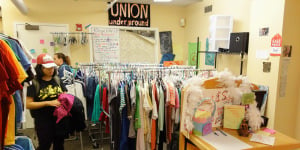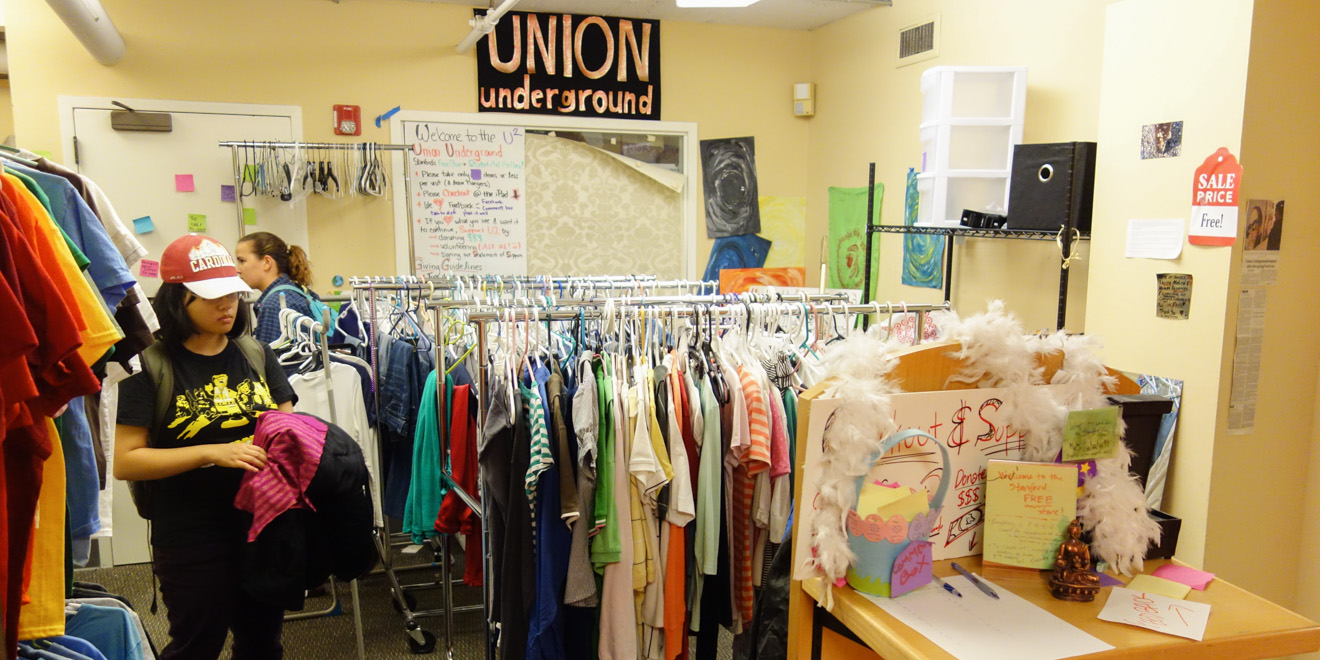
(RAHIM ULLAH/The Stanford Daily)
Just days before its grand reopening, Stanford’s Free Store — where students can take items such as clothes, microwaves and textbooks for free and donate their leftover things to help reduce waste — was notified that it would lose its location in Old Union’s basement.
It was nearly a week before the Nov. 1 grand reopening of The Free Store, and with many excited new volunteers, ambitious plans and a brand new year, the reopening was the first initiative to raise awareness about the store and make the upcoming school year a breakout year for The Free Store.
Justin Briggs, fourth year graduate student and co-director of The Free Store, had been in the process of finalizing the details of the reopening, when The Free Store would open a mini free store outside for a day with select items for people to take and boxes for people to donate. The reopening would be complete with fliers, posters and emails to spread the word of the event.
The final order of business for the reopening was to determine its location, and Briggs then went to speak with Old Union’s building manager to see if the front of Old Union could be used for the reopening event.
Briggs was then told that The Free Store would no longer be allowed to operate in the basement of Old Union.
The Free Store has operated in the basement of Old Union for over three years, but has gone unnoticed by many students. Starting as a business plan for an Alternative Spring Break project, The Free Store has since grown into a full-fledged student service with a strong emphasis on sustainability, aiming to reduce waste by giving students a place for their leftover things instead of them being thrown away, and to reduce consumption of new resources by providing these leftovers to other students in need.
“Students and other community members on campus have extra stuff that’s totally good but that they don’t need, and that’s most pronounced at the end of the quarter when people throw tons of stuff away,” Briggs said. “The Free Store provides an outlet for all of that stuff. If you have extra stuff that’s still good, instead of throwing it away, you can just bring it here.”
Items like clothes, shoes, water bottles, ramen, microwaves and textbooks can often be found in The Free Store. Sperry Top-siders and Samsonite suitcases are some of the more notable items, while Nerf Guns, costumes, cassette players, underwear and a solar-powered backpack that can charge smartphones make up the rather quirkier things.
“People donate lots of weird things that you wouldn’t expect,” Briggs said. “Basically anything that people have and then no longer want, could end up at the free store.”
Everything donated to The Free Store is available for all students for free, giving students a source for valuable items. Items that remain in The Free Store after a long time are donated to charity. The Free Store prides itself in not only creating a community of sustainability, but a community among students as well.
“It’s a great way to meet people outside of your social circle,” said Maria Deloso ’15, co-director of The Free Store. “Just because anyone can show up. You can get people who happen to be in Old Union and the next thing you know you’re in a 30-minute to one hour conversation and learning about their lives, and you would have never talked to them without The Free Store.”
The Free Store has postponed its reopening plans, but Briggs believes that if enough interest is generated, they can petition to keep the space. In doing so, The Free Store staff members have posted a short survey to gather statistics about the store, and are currently working with the ASSU to become an officially recognized group.
“We are working to clarify why we are being removed from the space,” Briggs said. “We have been told that the space is zoned for storage, but somehow this did not stop the building manager from approving it for the last three and a half years. It’s currently a mystery to me.”
Contact Jeremy Quach at jquach ‘at’ stanford.edu.
